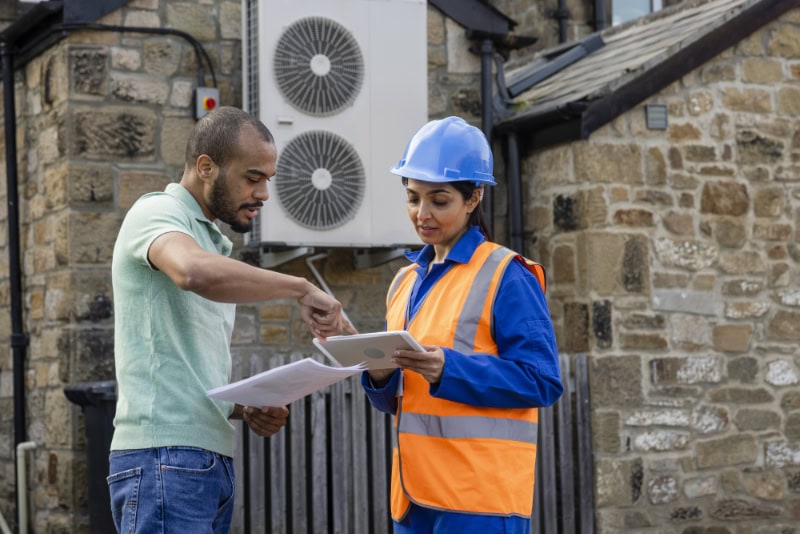What Is a Heat Pump?

What’s the best way to preserve resources? Working with what you already have. Heat pumps make your Lytle home more comfortable by using heat that already exists. It pushes heat from outdoors to indoors (to warm) or pulls heat from indoors to outdoors (to cool).
It stands apart from a gas furnace or boiler, which both use combustion to generate heat. As a result, heat pumps are much more efficient, using up to 50 percent less energy than furnaces or baseboard heaters, according to the US Department of Energy (DOE).
Heat pumps provide heating and cooling capabilities—there’s no need to supplement your heat pump with an air conditioner. That means you only have one system to worry about for repairs and maintenance costs.
Lonestar Comfort Services is pleased to bring the finest heating, ventilation, and air conditioning (HVAC) options to Texas residents. Here’s what you should know about heat pumps:
Heat Pump Types and How They Work
There are three basic categories of heat pumps:
1. Air Source Heat Pumps (ASHPs) are the most common and popular option. They harness heat energy in the air, transferring it from the outdoors to indoors on a cold day—or removing the heat from your home on a warm day. ASHPs have a compressor, an indoor coil, and an outdoor coil. The coils pump refrigerant, a substance that can absorb heat and release it. The indoor coil is also called a heat exchanger. It sends heat to your air ducts, and can even heat your water heater.
Older or lower-end heat pumps don’t fare as well in subfreezing temperatures. However, you can pair them with a furnace programmed to kick on when the temperature dips below 30 degrees Fahrenheit. This combination, known as a dual-fuel system, lets you enjoy the heat pump’s efficiency benefits without the risk of losing heat. Additionally, newer and more advanced heat pumps are hitting the market that can handle cold winters.
2. Water Source Heat Pumps (WSHPs) operate much like ASHPs—except they harness heat from a body of water instead of the air. For homeowners living near ponds, lakes, wells, or other water sources, a WSHP can be the perfect match. A series of underwater pipes cycle liquid, collecting heat. The heat gets picked up by the heat exchanger, which transfers it to your home via ductwork. On hot days, the process works in reverse to provide air conditioning.
While they cost more upfront, WSHPs use a fraction of the energy that the already-efficient ASHPs use. You’ll see considerable monthly savings and significantly reduce your carbon footprint.
3. Geothermal Heat Pumps (GHPs) use pipes with liquid to collect heat like WSHPs, but the pipes are underground instead of underwater. The Earth has relatively consistent underground temperatures, ranging from 45 to 75 degrees, depending on latitude. This constant temperature makes it a reliable source for heating.
GHPs have pipe systems buried four or more feet underground. The pipe system can run horizontally or vertically, depending on what you and your Lonestar Comfort Services specialist determine works best with your Texas property. Like other heat pump models, the heat gets transferred to the heat exchanger and distributed through your ducts with an air handler.
GHPs are among the most efficient heating sources on the planet. Like WSHPs, they cost more upfront but pay off significantly with long-term savings. Many are also eligible for federal tax credits. Although heat pumps electricity, carbon emissions can be cut to nearly zero when you pair them with a solar panel. Many owners also pair them with a ductless mini split, another great option to increase efficiency.
Heat Pump Maintenance and Upkeep
The DOE recommends an annual maintenance visit to keep your heat pump system is operating at its best. One of our Lonestar Comfort Services specialists will check for leaky ductwork, which can lead to energy loss. They will also inspect refrigerant levels. Refrigerant leaks can harm your indoor air quality (IAQ) and impair the functionality of your heat pump.
Schedule Service With Your Lonestar Comfort Services Expert Today!
We’re pleased to offer our unmatched heating and cooling expertise to our neighbors in Lytle, Texas. For reliable, efficient, and friendly home service, call Lonestar Comfort Services at 830-538-9450 today, or set up your visit online.
Need HVAC Service?
Contact the experts at Lonestar Comfort Services.
Call us at 830-538-9450!